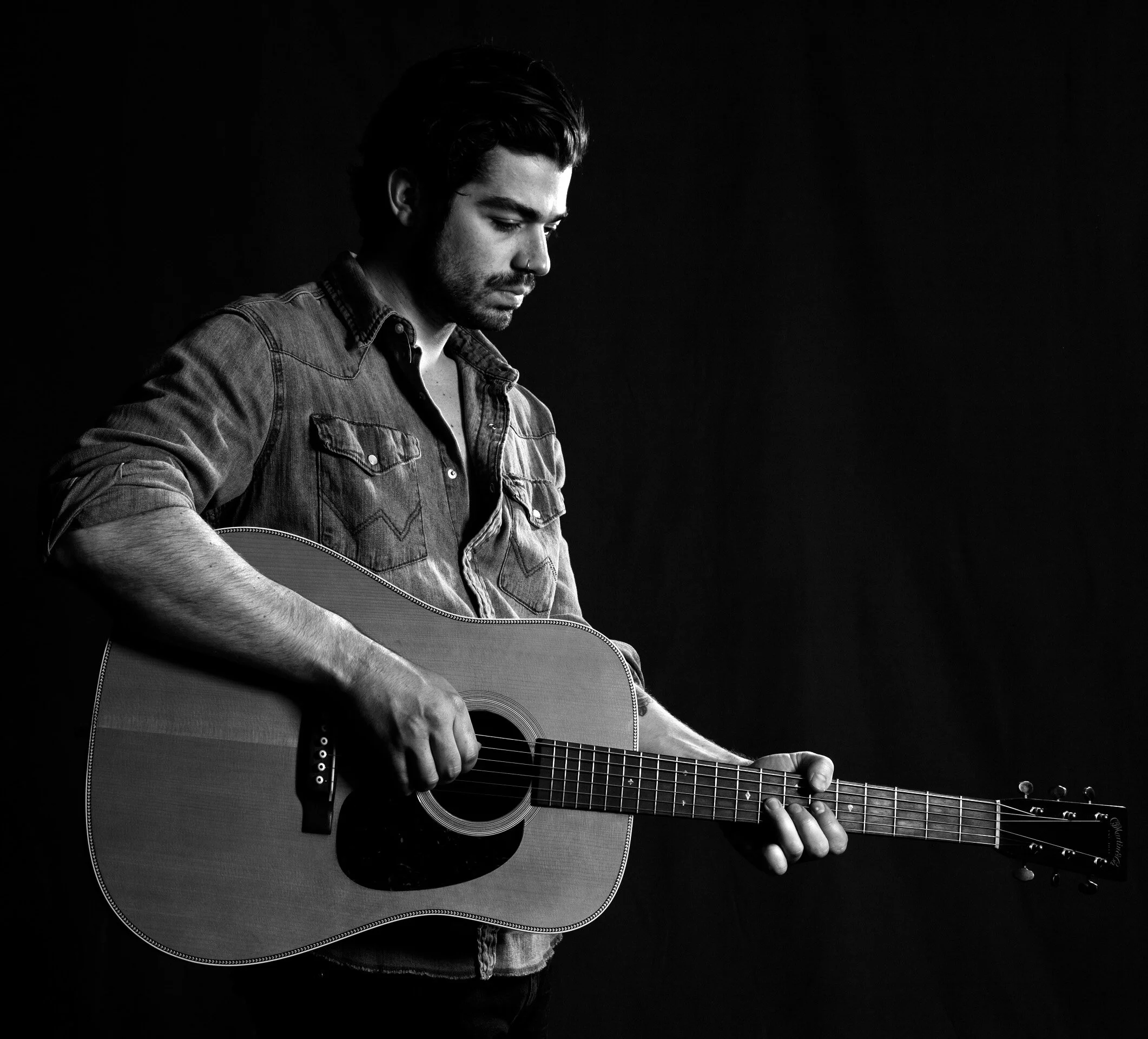Click Image to Download!
“I feel an undying need to create, to translate my most extreme feelings and emotions through songs that I hope we can all relate to. I would be terrified to see what my life looked like without this music”
On his hard-hitting new album Giving Up On Quitting, Texas born singer-songwriter Rett Smith places an intense focus on his inner truths through remarkably personal accounts of love, heartbreak and redemption, all while painting a lyrical landscape of his beloved southwest. Baring his all , Giving Up On Quitting finds Smith laying his own story on the line as the only songwriter on the record.
The album, which marks a departure from Smith’s more straightforward rocking material, is the result of an artist mining his own psyche and exploring the darker themes of depression, accountability and chemical escapism. For Smith, getting these songs written and recorded – self-produced at Los Angeles’ 64 Sound over the course of 8 days - was a necessary step in his journey as a musician, writer, and as a person.
“Most of this album was written alone or while traveling without immediate access to an instrument. I’ve always written more prose that I then morph into melodies, although this album exemplifies that approach more than most.” Smith says.
When he started writing the songs that would become Giving Up On Quitting, Smith knew he wanted the lyrics to be front and center. This idea manifested itself in lyrics with the heightened sense of vulnerability that Smith says comes from him writing in the first person .
“Although I’m obviously using analogies within the story to get my point across, I made a conscious effort to put myself into every lyric.”
Building the instrumentation around complex fingerpicked guitar melodies allowed Smith to set the vibe to match the despair in the lyrics. Working in this manner, he was able to create melodies that matched the vibrations happening in his head. This solitary approach to crafting songs ultimately resulted in the album’s sparse, atmospheric sound.
Between the guitar chops and old soul lyricism, Giving Up On Quitting leaves the impression that Smith has been a musician his whole life. In fact, he only discovered his talent for playing music after walking away from his career as an internationally competing downhill skier. He notes that many of the struggles that come to light in the music are shared by those who have felt they already had their chance and lost it, regardless of their field.
“I always expressed myself with words on paper as an escape and coping mechanism, but it took me until my early 20’s to completely change my life and realize I could fully dedicate myself to the craft.” Smith says.
Compared to previous albums like his 2015 debut Tularosa, 2016’s Oscuro and his heavier 2017 side project SAENTS, Giving Up On Quitting finds Smith carefully layering instrumentation to create a distinctly Western sound that is inspired by his roots in Texas and New Mexico. The sound complements the vivid, autobiographical lyrics that pull the listener into a world that is tormented yet always seeking a way to overcome. There is a distinctive twang throughout much of the music, and Smith’s gritty and honest vocals strike a perfect balance between his personal hardships and universal truths that resonate with all of us.
As a Texan by birth and someone who still has close ties to the Lone Star State, Smith channels legendary troubadours like Guy Clark and Steve Earle. Drawing much of his sound and inspiration from what he calls the “Texas ideal of cowboy troubadours,” Smith also connects these acts with brooding poets like Leonard Cohen, Tom Waits and Nick Cave. The ability to be truth-tellers in song and poets to their core is what makes all of these acts major influences on Smith.
“The common thread to me on these songs is sharing my most extreme version of the truth. I've always been drawn to people who write with that front and center,” says Smith.
The album’s acoustically picked first track “Better Day” takes us inside Smith’s mind as he comes to terms with a failing relationship while succumbing to his own darkness and depression. Opening with the grim and poignant line “riding with the devil making him my guest,” the song sets the tone for the rest of the album.
Like that of the work of his songwriting heroes, Smith openly describes his self-doubt ,inner turmoil and depression, while allowing the slightest bit of optimism for the power of love.
“Even though I am the one narrating and am of course describing my own feelings, I by no means believe I’m unequivocally innocent. I desperately try to learn from past experiences and in fact, I hope these songs express the level of my own accountability to the listener.“
“Hardship Highways” is perhaps the best example on the album of Smith turning the bumpy road of life into a sonically rich song. With its mournful, reverb-drenched vocals set to a melancholy, bare bones soundtrack of acoustic and electric guitar, and a simple yet commanding drum beat, the song is a tale of a life lived on the edge as Smith recounts bad choices and mistakes fueled by drugs and alcohol. He isn’t looking for redemption or pity; he is simply sharing his life with the listener knowing that somebody out there has likely been down the same road.
“That's one of the most literal songs on the record because it's just hanging on those truths. Things get better but without accountability I don't get better. It's floating through these scenarios that happened - everything in that song was brought on by me,” he says, adding that lingering beneath the pain and sadness of the narrative is a sense of optimism. “I want things to get better and I don't want to live in this space of just being miserable.” Dealing with these issues and fighting to get better is a recurring theme across the songs on Giving Up On Quitting.
On “Rattle Snakes,” another one of the album’s lead singles, Smith sings with muffled, whispered vocals reminiscent of Tom Waits. Musically, it is one of the most compelling tracks on the album with a shuffling, Western feel accentuated by Smith’s alternating guitar picking. It is perhaps the best encapsulation of the album’s shadowy desert landscape.
“That's a song that really resonates with where I'm from. It’s one of the most outwardly enjoyable songs to play live.”
While the more stripped down acoustic tracks on the album showcase Smith’s evolution as a songwriter, he still manages to work in plenty of the guitar shredding many fans know him for. “Corner Kisses” hits hard with its twangy, psychedelic guitar and huge crashing drums, while “Luck Burns Deep” is a bluesy rock and roll anthem with Smith laying down red hot guitar licks.
Though he is far removed from his days as a professional athlete, the same drive that allowed him to flourish as an athlete is what pushes him as a musician. Even with the undeniably morose tone of his songs, Smith insists that actually making music is something that fills him with gratitude and joy.
“It's an interesting thing because I can live in this space of depression and battling my self-inflicted demons, while simultaneously feeling extremely grateful being able to do it at all. Sure I'm talking about grief and all these hard places one finds himself in, but there's so much joy in being able to create. I feel genuinely lucky,” he says.
With a raw and personal collection of songs now being shared with the world, Smith is ready to move into the next stage of his musical journey. At this point in time, he can’t imagine doing anything other than playing music. His love for writing songs while also using it as a therapeutic outlet is what keeps pushing him forward.











